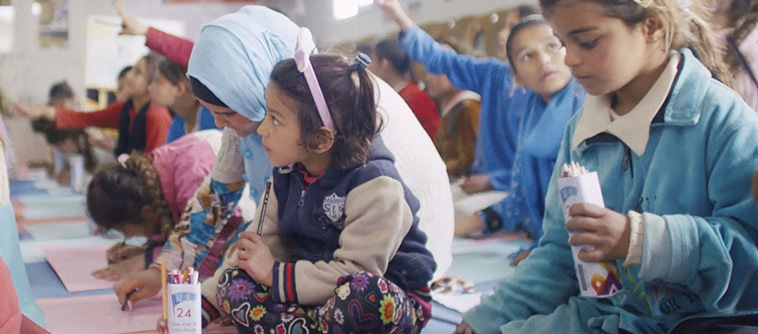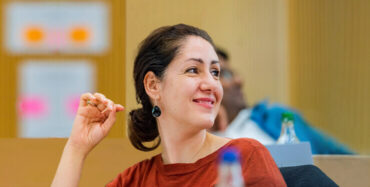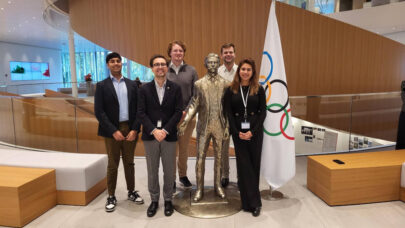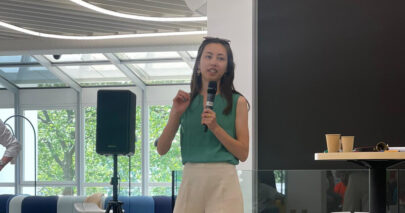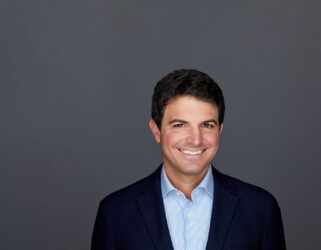Terre des hommes (Tdh) is a leading Swiss children’s rights organization dedicated to child protection, improving children’s health, and crisis intervention worldwide. The organization is currently implementing far-reaching changes to introduce greater agility and extend its capacity to impact the lives of the world’s most vulnerable children.
IMD recently talked to Thierry Agagliate, Head of its Disruptive Innovation Unit and IMD Professor Albrecht Enders who leads IMD’s partnership with Tdh.
Fast growth, greater impact
In its nearly sixty-year existence, Terre des hommes has implemented numerous outstanding projects around the world. However, as Thierry Agagliate explains, the hands-on implementation was typically done on a local or regional level. The organization realized that with improved sharing of global best-practices, it would have greater impact. Tdh has progressively sought ways to build such capacity over the last decade. Today, it enjoys the scale and expertise to serve as a global player in the mission to help children through healthcare, social justice and emergency aid.
One project, for example, is its mobile health service in Africa – the biggest such project there is. IeDA (Integrated e-Diagnostic Approach) is an innovative service that uses digital tablets and mobile applications to improve children’s medical treatment in West Africa. The impact of this program, which had one million beneficiaries last year, is set to double in 2018.
Tdh’s growing success in providing critical support attracted the attention of major international donors – thus expanding the organization’s budget and further strengthening its ability for to make a difference. Thierry says this increase in outside investment has a direct link to strategic institutional re-alignment, boosted by the organizational leaders’ freedom to innovate.
Innovation: critical to the evolving world of NGOs
According to Thierry, evolving perspectives and perceptions influence the work of NGOs. Organizations need to be sensitive to this and adapt with creative approaches. “It’s a matter of making a real difference for increasingly complex issues that children, families and professionals face,” says Thierry.
“Previously, our organization – and other NGOs too – were welcomed in developing countries; because we were from Switzerland, we were viewed as having a lot of resources to bring in.” This perspective has changed, says Thierry. Tdh now hears questions like: ‘Why is a Swiss NGO – rather than a local or regional institution – going into places like India, Brazil, Romania or even much less-developed countries to address complex socio-economical, human rights and humanitarian challenges with partners who expect more from international cooperation?’”
It takes a certain flexibility to respond appropriately in such a context – and this is an advantage Tdh has over bigger global player in children’s rights, who are typically backed by a church or a global activist movement. Without being constrained by a specific agenda like those players, Tdh is comparatively agile thanks to its high level of expertise, as well as its willingness to invest and take the necessary risks for innovative global solutions, according to Thierry. “This is our contribution to the global agenda,” he says.
Yet there was the sense that they weren’t reaping 100% of the benefits of creative initiatives. “We have always had strong potential for innovation but were not always harnessing that potential strategically,” says Thierry. For example, resources weren’t necessarily being allocated most effectively to some particularly strategic, innovative projects since the budgeting process encouraged risk-adverse decision making in some cases. But where do you start when you want to better channel innovation?
Unlocking innovation potential with action learning
To meet this challenge, Terre des hommes began a working group on innovation and strategy – this ultimately brought the humanitarian organization in contact with IMD. As part of the working group, a number of senior leaders enrolled in IMD’s strategy Advanced Management Program (AMP) and the High Performance Leadership program (HPL).
Thierry, who was part of that group, says one of the key takeaways was to integrate the concept of being “ambidextrous”. An “ambidextrous” organization balances ongoing operations – continuing excellence in current activities – with experimentation – innovating to create new avenues of growth for the future.
“In all honesty, it was the best education program I have participated in over the course of my entire career,” he says. “The pedagogy was logical and progressive; it was a super way to help me understand strategy and learn more. And the professors were top-notch.”
Business education – it’s relevant for NGOs
The program that Thierry and his colleagues attended – alongside participants coming from a wide variety of commercial industries – focused on managing transformation. According to Thierry, NGOs, international organizations, and other not-for-profits need to evolve just as much as companies do. While he says NGOs and their funding are “special animals,” they are very similar to corporates with regard to support functions, management and leadership.
This reflection is supported by Program Director Albrecht Enders: “Whether it’s an NGO or a corporate, there’s not a whole lot of difference… these different kinds of organizations can learn a lot from each other,” he says. “We see IMD to play a very central role that is to act as a platform to allow different stakeholders to come together to share ideas and come to integrative solutions to these very big, massive challenges.”
For Thierry and other executives at Terre des hommes, including General Director Vito Angelillo, part of the lasting outcomes from IMD was that the learning has helped move the organization from being set up around administrative accountability logic, to being driven by an entrepreneurial logic.
“Before, at TdH we were making decisions based on how to make the best use of our budget year after year. Our reasoning was built around having zero investment risk,” says Thierry. “But we work on social phenomena and crisis situations, which are super complex. That requires agility.”
Immediate impact, ongoing value
Thierry says he appreciated having the time and the support to really reflect on his organization’s strategy. “I was very inspired by my three weeks in the program.” “Afterwards, it informed a lot of what I wrote in a paper for the organization, which was integrated into our strategy for 2020 and beyond.”
One big change that came with the new strategy was the creation of the Disruptive Innovation Unit, with Thierry as its Head. Thierry explains that the program helped him build a capacity to innovate at the organization. “The learning is something I keep using today,” he says, noting that he regularly returns to the notes he took during the program, with the tools and frameworks he learned, to inform his day-to-day management.
Buy-in from the top
Getting the top leaders on board is essential to being able to drive change in an organization. Having the highest decision-makers participate in programs at IMD has been a key part of that.
“The fact that our General Director and high-level management participated in IMD’s programs has made a big difference, particularly with regard to strategic management,” says Thierry. “One of the things I learned was that the management of disruptive innovation should be at the very core of our strategy, and it should be overseen by our General Director. Now everyone at the top is on board and they are behind us when we need to make investments in innovation.”
Extending the transformative benefits of agility
The next step for Terre des hommes is cascading the learning down to other parts of the organization. This will help ensure that its stronger resource base is optimized to make an even greater positive impact on the lives of children and their families around the world.
Related reading:
The transformational journey of an NGO: Interview of Vito Angelillo, Terre des hommes General Director, former HPL participant
Bringing impactful executive learning to the humanitarian sector: ICRC and IMD partnership boosts learning at HQ and in hard to access locations in the field
Advanced Management Program (AMP)
High Performance Leadership (HPL)
